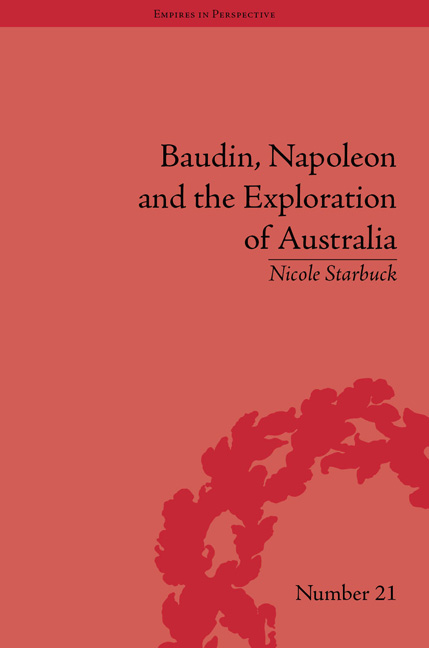Book contents
- Frontmatter
- CONTENTS
- Acknowledgements
- List of Figures
- Introduction: Voyaging out of the Enlightenment
- 1 Between Revolution and Empire: France and its Australian Voyage in 1800
- 2 ‘I Should Wish … to Establish a Few Tents on Shore’: The Port Jackson Stay
- 3 Disciplining Passions: French Naval-Voyagers at Anchor
- 4 The French and the British: A Diplomatic Relationship
- 5 Liberty, Equality and ‘Civilization’: Observations of Colonial Aborigines
- 6 Swans, Frogs and Rum: Natural History in an ‘Unnatural’ Space
- 7 Baudin's ‘New Expedition’
- 8 Epilogue: Voyaging into the Nineteenth Century
- Notes
- Works Cited
- Index
1 - Between Revolution and Empire: France and its Australian Voyage in 1800
- Frontmatter
- CONTENTS
- Acknowledgements
- List of Figures
- Introduction: Voyaging out of the Enlightenment
- 1 Between Revolution and Empire: France and its Australian Voyage in 1800
- 2 ‘I Should Wish … to Establish a Few Tents on Shore’: The Port Jackson Stay
- 3 Disciplining Passions: French Naval-Voyagers at Anchor
- 4 The French and the British: A Diplomatic Relationship
- 5 Liberty, Equality and ‘Civilization’: Observations of Colonial Aborigines
- 6 Swans, Frogs and Rum: Natural History in an ‘Unnatural’ Space
- 7 Baudin's ‘New Expedition’
- 8 Epilogue: Voyaging into the Nineteenth Century
- Notes
- Works Cited
- Index
Summary
The Géographe and the Naturaliste embarked men from each rank of French society, from the navy, the army and the sciences, from across the Republic. During their four years at sea their decks hummed with talk – whispered wistfully between hammocks at night or shouted in anger at table in the great cabin – coloured with memories of revolution and war, with dreams of new lands and new peoples. Indeed, while France was advancing toward the era of the Grand Empire, Baudin's ships continued to carry the varied yet characteristic concerns, aspirations and ideals of 1800; and, eventually in Sydney, the voyagers would, each in their own way, act out their post-Revolutionary status. Baudin himself would try to evoke the ambitions of his nation as he endeavoured to prepare the perfect voyage for his superiors. However, performing and fulfilling the desires of turn-of-the-century France was not a straightforward matter. This was a period of transformation in French society and government: the end of the Revolution and the beginning of the ‘Napoleonic adventure’, the promise of stability following upheaval, the waning of Enlightenment philosophy and the rise of professionalized science. Therefore, in order to understand the expedition's sojourn at Port Jackson, consideration must first be given to the key features of its background: the complex and changing nature of early Consulate-era France, the emergence from this world of the Baudin expedition, and how – in setting sail for Port Jackson – that expedition eventually diverged from its official instructions of 1800 in order to more satisfactorily complete them.
Early Consulate-Era France
Bonaparte had assumed the role of First Consul only eleven months before the Baudin expedition set out for Australia; even so, his influence in political circles, on the position of France in Europe and on the mentalité of the French people had already proven potent. During the mid-1790s, Bonaparte's triumphs in the field had corresponded fortuitously with the growing militarization of France and a growing need among the people, including the revolutionaries, for a more robust and centralized government.
- Type
- Chapter
- Information
- Baudin, Napoleon and the Exploration of Australia , pp. 11 - 24Publisher: Pickering & ChattoFirst published in: 2014

